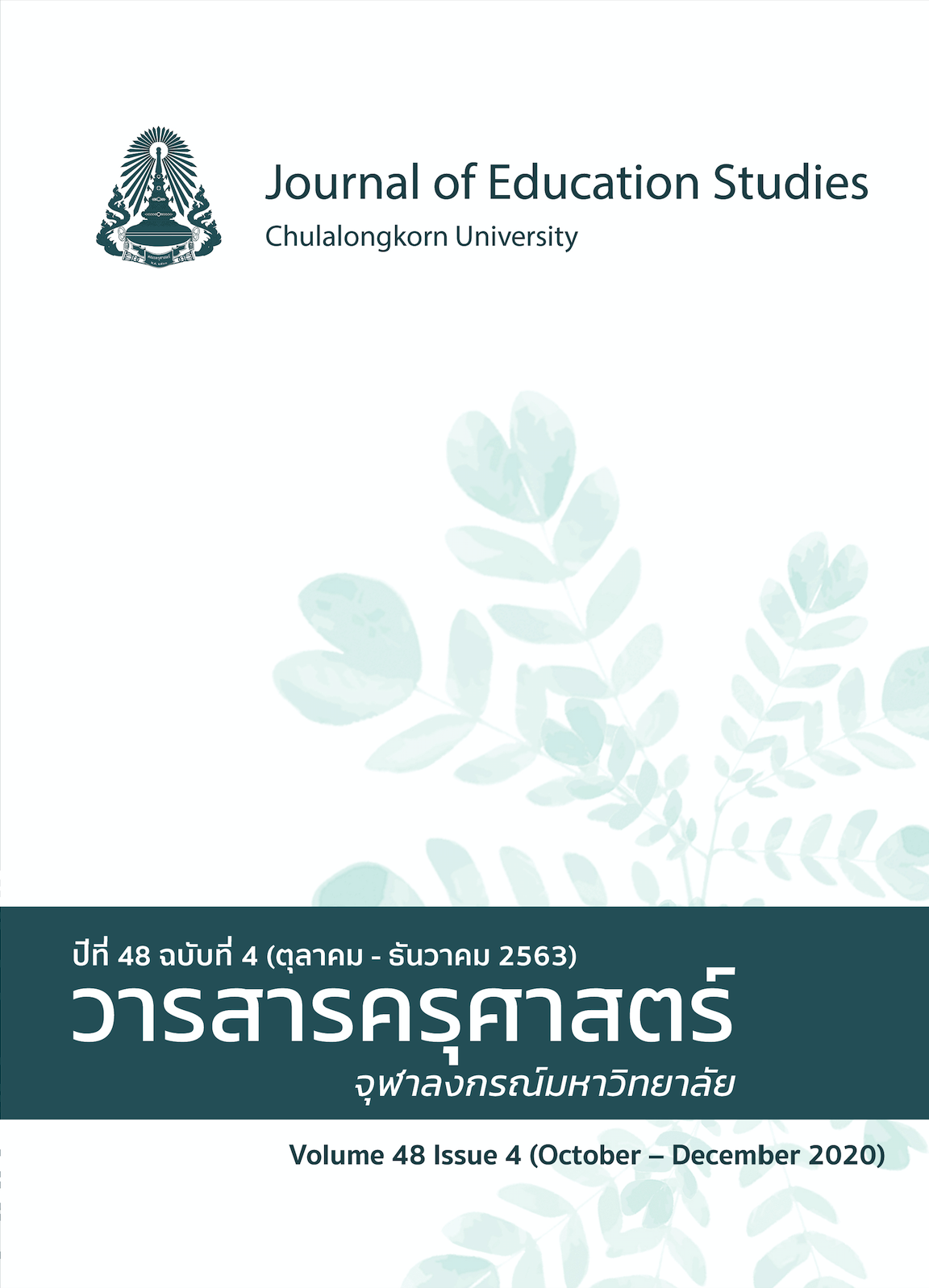A Lifelong Education Model for ‘Out-of-School’ Children and Youths by Community Organisations
DOI:
https://doi.org/10.14456/educu.2020.10Keywords:
lifelong education, ‘out-of-school’ children and youths, community organisationsAbstract
The purpose of this study was to develop a lifelong education model for ‘out-of-school’ children and youths by community organisations. This study involved qualitative research using participatory action research (PAR) as the research methodology. The research process was conducted in collaboration with a researcher and Subsinpattana community organisations. There were four stages of the PAR cycle: 1) Planning 2) Action 3) Observation and 4) Reflection. The study site was Subsinpattana Community, Samaedam District, Bang Khunthien, located in the Bangkok area. The results found that a lifelong education model for ‘out-of-school’ children and youths by community organisations was consistent with the problems, causal factors and needs of ‘out-of-school’ children and youths. The model consisted of five components: 1) Beliefs which involve the potential of persons, especially ‘out-of-school’ children and youths. The beliefs comprise philosophy, concepts and principles; 2) Contexts of the model, including the context of problems in the community and desirable goals to be achieved; 3) People who have been involved within the model, including the target group of ‘out-of-school’ children and youths provider was community organisations and community networks; 4) Lifelong education plan, including contents related to occupational, theoretical and practical skills, learning activities, learning resources and evaluation of competencies; 5) Lifelong education approaches consisting of three types including formally structured, non-formally structured and non-structured.
References
กระทรวงศึกษาธิการ. (2542). พระราชบัญญัติการศึกษาแห่งชาติ. http://www.moe.go.th/ main2/plan/ p-r-b42-01.htm
จันทิมา ปัญจวัฒน์. (2543). การจัดกิจกรรมการศึกษานอกระบบโรงเรียนสำหรับเด็กด้อยโอกาสในวัดสวนแก้ว [วิทยานิพนธ์ปริญญาครุศาสตรมหาบัณฑิต]. Chulalongkorn University Intellectual Repository (CUIR). http://cuir.car.chula.ac.th/handle/123456789/64291
มนัสวาสน์ โกวิทยา. (2557). กิจกรรมการเรียนรู้ตลอดชีวิตของต่างประเทศ. ใน สุวิธิดา จรุงเกียรติกุล (บ.ก.), การศึกษาและการเรียนรู้ตลอดชีวิต (น. 72-103). โรงพิมพ์แห่งจุฬาลงกรณ์มหาวิทยาลัย.
ระบบสารสนเทศ สำนักงานส่งเสริมการศึกษานอกระบบและการศึกษาตามอัธยาศัย. (ม.ป.ป.). ภาพรวมจำนวนนักศึกษา (กลุ่มเป้าหมาย). http://203.172.142.230/mis-dashboard/
สมบัติ สุวรรณพิทักษ์. (2557). แนวทางการจัดการศึกษาตลอดชีวิต : นโยบายสู่การปฏิบัติ. ใน สุวิธิดา จรุงเกียรติกุล (บ.ก.), การศึกษาและการเรียนรู้ตลอดชีวิต (น. 180-204). โรงพิมพ์แห่งจุฬาลงกรณ์มหาวิทยาลัย.
สำนักงานปลัดกระทรวงศึกษาธิการ. (2547). การจัดการศึกษานอกโรงเรียนตามหลักสูตรการศึกษาขั้นพื้นฐาน พุทธศักราช 2544. คุรุสภาลาดพร้าว.
สำนักงานเลขาธิการสภาการศึกษา. (2559). สภาวะการศึกษาไทย ปี 2557/2558 "จะปฏิรูปการศึกษาไทยให้ทันโลกในศตวรรษที่ 21 ได้อย่างไร". พิมพ์ดีการพิมพ์.
สำนักงานส่งเสริมสังคมแห่งการเรียนรู้และคุณภาพเยาวชน. (2555). สถานการณ์เด็ก เยาวชน และผู้ด้อยโอกาสทางสังคม. http://www.qlf.or.th/Home/Details?contentId=147
อาชัญญา รัตนอุบล. (2557). คำจำกัดความ แนวคิด และลักษณะการศึกษาตลอดชีวิต. ใน สุวิธิดา จรุงเกียรติกุล (บ.ก.), การศึกษาและการเรียนรู้ตลอดชีวิต (น. 1-30). โรงพิมพ์แห่งจุฬาลงกรณ์มหาวิทยาลัย.
ภาษาอังกฤษ
Dave, R. H. (1973). Lifelong education and school curriculum. UNESDOC Digital Library. http://unesdoc.unesco.org/images/0000/000055/005594eo.pdf
Niketan, S. (1984). Education of out-of-school children: Case studies of selected non-formal learning programmes in South Asia. The Commonwealth iLibrary. http://www.thecommonwealth-ilibrary.org/commonwealth/education/education-of-out-of-school-children_978184859 3756-en
UNESCO. (2004). Flexible Learning Strategies for Out-of-School Children and Youth. Retrieved from http://unesdoc.unesco.org/images/ 0022/002230/ 223023E.pdf
UNICEF Bangladesh. (2012). Education for out of school children (OoSC). http://www.unicef.org/bangladesh/OOSC_-_Bangladesh_final_ DRAFT_020412.pdf
Yasunaga, M. (2014, May 2). Non-formal education as a means to meet learning needs of out-of school children and adolescents. All in School, UNICEF. http://ais.volumesquared.com/wp-content/uploads/2015/01/OOSC-2014-Non-formal-education-for-OOSC-final.pdf
Downloads
Published
How to Cite
Issue
Section
License

This work is licensed under a Creative Commons Attribution-NonCommercial-NoDerivatives 4.0 International License.




